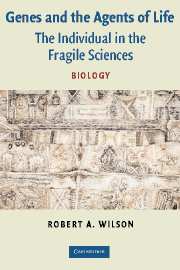Book contents
- Frontmatter
- Contents
- List of Tables and Figures
- Acknowledgments
- PART ONE INDIVIDUALS, AGENCY, AND BIOLOGY
- PART TWO SPECIES, ORGANISMS, AND BIOLOGICAL NATURAL KINDS
- 3 What Is an Organism?
- 4 Exploring the Tripartite View
- 5 Specious Individuals
- PART THREE GENES AND ORGANISMIC DEVELOPMENT
- PART FOUR GROUPS AND NATURAL SELECTION
- Notes
- References
- Index
4 - Exploring the Tripartite View
Published online by Cambridge University Press: 05 June 2012
- Frontmatter
- Contents
- List of Tables and Figures
- Acknowledgments
- PART ONE INDIVIDUALS, AGENCY, AND BIOLOGY
- PART TWO SPECIES, ORGANISMS, AND BIOLOGICAL NATURAL KINDS
- 3 What Is an Organism?
- 4 Exploring the Tripartite View
- 5 Specious Individuals
- PART THREE GENES AND ORGANISMIC DEVELOPMENT
- PART FOUR GROUPS AND NATURAL SELECTION
- Notes
- References
- Index
Summary
REALISM AND AGENCY
Building on the insights of the Simple View of organisms, I have given the concept of living agency a central place in the view of organisms sketched in the previous chapter. That concept also plays a structuring role in Genes and the Agents of Life as a whole. It is now time to raise, and at least begin to address, a difficult issue about biological agency relevant both to the Tripartite View of organisms and to the book more generally. To put it plainly: is there an objective, mind-independent fact of the matter about agency? Or is agency, and just what counts as an agent – and so a biological agent, a living agent, an organism – in the eye of the beholder? The issue is whether a realist view of agents, a sort of default view for most biologists and many philosophers of science, can be defended.
Thus far, I have taken for granted a realist view of agency. This was true of Part One in adopting a working characterization of an agent as a physically bounded locus of action, together with appeals to kinds of agents, to paradigms of these different kinds, and to the idea that agents are organized hierarchically. The very question “What are the agents of life?” might be thought to presuppose that agents are mind-independent, objective features of the world, rather than figments of our imagination (like pink elephants) or products of our collective social efforts (like conventions or human social practices).
- Type
- Chapter
- Information
- Genes and the Agents of LifeThe Individual in the Fragile Sciences Biology, pp. 70 - 95Publisher: Cambridge University PressPrint publication year: 2004



